JUNIPER
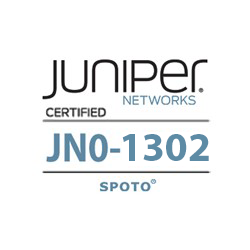
最新の JUNIPER 過去問と実践テストで JUNIPER 試験 2024 に合格
認定試験について知っておくべきこと Juniper Networks 認定プログラム (JNCP) 試験情報
Juniper Networks 認定プログラム (JNCP) は、筆記試験と実技ラボ試験のマルチティアプログラムです。私たちの使命は、世界のリーディングネットワーク専門家の中でJuniperのスキルセットを検証することです。
研究によれば、Juniper製品でトレーニングを受けたITプロは34%生産性が向上します。今すぐ効率を証明し始めましょう。キャリアの次のステップを踏み出してください。
Juniper Networks 認定トラック 組織とキャリアを進めるための技術を選択してください。
以下の認定トラックをご覧ください:
自動化とDevOps: JNCIA-DevOps → JNCIS-DevOps
クラウド: JNCIA-Cloud → JNCIS-Cloud → JNCIP-Cloud → JNCIE-Cloud
データセンター: JNCIA-Junos → JNCIS-ENT → JNCIP-DC → JNCIE-DC
設計: JNCDA JNCDS-DC/JNCDS-SEC/JNCDS-SP
エンタープライズルーティングとスイッチング: JNCIA-Junos → JNCIS-ENT → JNCIP-ENT → JNCIE-ENT
Mist AI: JNCIA-MistAI → JNCIS-MistAI
セキュリティ: JNCIA-SEC → JNCIS-SEC → JNCIP-SEC → JNCIE-SEC
サービスプロバイダールーティングとスイッチング: JNCIA-Junos → JNCIS-SP → JNCIP-SP → JNCIE-SP
Juniper 過去問とは何ですか?Juniper 過去問の利点は? Juniper過去問は、Juniper Networksの認定試験からの質問と回答のコレクションです。これらは、人々が過去問の質問と回答を単純に暗記することで、試験の準備と合格を助けることを目的としています。
Juniper過去問のいくつかの利点は以下の通りです:
100%正確な試験問題と回答があり、試験合格をサポートします。すべての試験問題は最新の試験バージョンに基づいており、自信を持って試験準備を行えます。
Juniper 過去問は試験合格を助けます - 過去問には試験に出る実際の問題が含まれているため、質問と回答を暗記することで試験合格の可能性を大幅に高められます。
Juniper 過去問は学習時間を節約します - 過去問の質問と回答を単純に暗記することで、公式教材を学習するのに比べて、試験準備に必要な時間を大幅に短縮できます。
Juniper 過去問は実際の試験問題に触れる機会を提供します - 過去問には現在の試験からの実際の問題が含まれているため、実際の試験で直面する問題の種類や難易度に対する理解を深められます。
JUNIPER C03 過去問についての質問...
JUNIPER過去問を使用することで、認定試験の合格は保証されますか?
SPOTOは100%本物の試験問題と回答を提供しており、試験準備に最適な方法です。試験問題と回答を暗記するだけで、試験に合格できます。
信頼できる最新のJUNIPER過去問はどこで見つけられますか?
SPOTOは専門的な過去問提供者であり、数万の受験者が試験に合格する手助けをしています。SPOTOを信頼しても問題ありません!
SPOTOの過去問にはいくつの問題がありますか?
SPOTOの過去問の問題数は実際の試験に関連しています。すべての試験問題を100%カバーするために、試験問題数よりも多い演習問題を提供します。通常、試験問題の数は200〜300問です。
過去問が不安定になった場合はどうなりますか?
私たちは試験の変更に応じてCiscoの過去問を更新し、3日以内に最新の安定した試験問題を提供します。
SPOTOの過去問を使用して試験に失敗した場合はどうすればいいですか?
SPOTOによって提供されるすべての試験問題は最新で有効です。試験に失敗した場合は、試験に成功するための新しいサービスを提供します。
JN0-611 Exam Dumps Cloud Professional JNCIP-Cloud
Here are the details and objectives of the JNCIP-Cloud JN0-611 exam: 1. Exam Overview: The JN0-611 exam is designed to validate the knowledge and skills required for Juniper Networks Certified Professional - Cloud (JNCIP-Cloud) certification. This certification verifies the candidate's ability to apply cloud computing concepts and techniques, evaluate cloud platforms and services, design and implement cloud security, and migrate workloads to the cloud. 2. Exam Topics: - Advanced Cloud Computing: In-depth knowledge of cloud computing concepts, service models (IaaS/PaaS/SaaS), deployment models (public/private/hybrid), pros and cons, use cases, etc. Evaluate how key characteristics like scalability, elasticity, and resilience are enabled in cloud environments. - Cloud Platform and Service Evaluation: Analyze various cloud platforms such as AWS, Azure and GCP as well as their IaaS, PaaS and SaaS offerings. Compare and contrast their capabilities, limitations, pricing models, etc. to determine optimal solutions. - Cloud Native Application Design: Design microservices-based and event-driven applications for deployment in cloud environments. Address scalability, resilience, automation, and portability requirements. Leverage containerization, orchestration, and cloud services. - Migration Strategy and Planning: Develop strategies and plans for migrating on-premises workloads to different cloud platforms. Address challenges around compatibility, security, networking, storage, etc. Choose optimal migration approaches for specific workloads. - Cloud Security: Implement security controls and best practices for cloud infrastructure, platforms, applications, and data. Address risks around multi-tenancy, loss of physical control, lack of transparency, etc. Leverage tools and techniques for access control, encryption, auditing, etc. - Automation and Orchestration: Apply tools like Ansible, Chef, Terraform, Kubernetes, etc. to automate provisioning, configuration, deployment, scaling, and management of cloud resources and workloads. Benefits and use cases of automation and orchestration in cloud environments. 3. Exam Format: 65 multiple choice questions (single and multiple responses), 105 minutes. 4. Exam Tips: - Expert in key cloud computing concepts, models, pros and cons, use cases, and enabling characteristics. - Skilled in analyzing and evaluating various cloud platforms such as AWS, Azure and GCP as well as their IaaS, PaaS and SaaS offerings. - Proficient in designing microservices-based and event-driven applications for the cloud. Expert in related concepts such as containers, orchestration tools, and cloud services. - Knowledgeable in developing optimal migration strategies and plans for different workloads based on challenges. Understand migration approaches like re-hosting, re-platforming, re-architecting, etc. - Expert in implementing security controls and best practices specifically for cloud infrastructure, platforms, applications, and data. Familiar with tools and techniques for access control, encryption, auditing, etc. - Skilled in tools like Ansible, Chef, Terraform, Kubernetes, etc. for automating provisioning, deployment, scaling, config management, etc. of cloud resources and workloads. - Significant hands-on experience with a variety of cloud platforms, services and tools required. Stay on the cutting edge of cloud technologies and security. - The passing score is 300 out of 400 points. Extensive preparation and practical experience are essential. In summary, the JN0-611 exam evaluates a candidate's skills and competence in applying advanced cloud computing concepts. Experience with planning, designing, implementing and operating various cloud solutions and workloads can be demonstrated. With diligent preparation, JNCIP-Cloud certification signifies the ability to work with and optimize public and private cloud environments for organizations. It brings significant career opportunities as a cloud architect, cloud systems engineer or cloud security specialist.
JN0-212 Exam Dumps Cloud Associate JNCIA-Cloud
Here are the details and objectives of the JNCIA-Cloud JN0-212 exam: 1. Exam Overview: The JN0-212 exam is designed to validate the knowledge and skills required for Juniper Networks Certified Associate - Cloud (JNCIA-Cloud) certification. This certification verifies the candidate's basic understanding of cloud computing concepts, platform as a service (PaaS) platforms and application strategies. The certified candidate can articulate cloud benefits, PaaS offerings, application designs, and best practices for cloud deployment. 2. Exam Topics: - Cloud Computing Concepts: Understand the fundamentals of cloud computing including models(IaaS, PaaS, SaaS), deployment models(public, private, hybrid), pros and cons of cloud adoption, etc. - PaaS Offerings: Knowledge of various PaaS platforms and solutions such as AWS Elastic Beanstalk, Google App Engine, Azure App Service, etc. Familiar with their capabilities, benefits, and differences. - Application Design Considerations: Factors to consider when designing applications for the cloud including scalability, elasticity, statelessness, multi-tenancy, high availability, security, automation, etc. Best practices for cloud-native application designs. - Automation and Orchestration: Concepts and tools for automating cloud infrastructure and application deployment. Benefits of automation and orchestration. Tools like Ansible, Chef, Puppet, Kubernetes, etc. - Monitoring and Security: Methods and tools for monitoring cloud infrastructure and applications. Also security concepts, risks, and best practices including access control, encryption, auditing, etc. specifically for cloud environments. - Migration Strategies: Approaches and processes for migrating on-premises applications and infrastructure to the cloud including re-architecting, re-platforming, re-factoring, and re-hosting. Challenges, tools, and best practices for cloud migration. 3. Exam Format: 65 multiple choice questions (single and multiple responses), 90 minutes. 4. Exam Tips: - Understand fundamentals of cloud computing models(IaaS/PaaS/SaaS), cloud types(public/private/hybrid), pros and cons, etc. - Familiar with major PaaS platforms and services like AWS Elastic Beanstalk, Google App Engine, Azure App Service, etc. - Know factors to consider when designing cloud-native applications. Scalability, high availability, automation, and security best practices. - Concepts and tools for automating and orchestrating cloud infrastructure and applications. Benefits of automation. - Methods and tools for monitoring cloud environments and applications. Know cloud security risks, concepts and best practices. - Approaches and processes for migrating on-premises infrastructure and apps to the cloud. Challenges, tools and best practices. - Hands-on experience with PaaS platforms and cloud-native designs required. Stay up-to-date with latest tools, techniques and offerings. - The passing score is 70%. Extensive preparation and hands-on practice recommended. In summary, the JN0-212 exam evaluates a candidate's basic knowledge of cloud computing, cloud platforms and application strategies. With preparation and experience, JNCIA-Cloud certification helps to demonstrate a basic and practical understanding of the cloud, paving the way for career opportunities as a cloud associate or cloud operations engineer. Candidates can benefit from continued learning and experience to advance in their cloud career.
JN0-422 Exam Dumps Automation and DevOps Specialist JNCIS-DevOps
Here are the details and objectives of the JNCIS-DevOps JN0-422 exam: 1. Exam Overview: The JN0-422 exam is designed to validate the knowledge and skills required for Juniper Networks Certified Specialist - DevOps (JNCIS-DevOps) certification. This certification verifies the candidate's ability to apply and operate Juniper's DevOps paradigm to produce operational efficiencies, accelerate service delivery, and enhance infrastructure agility while maintaining reliability and security. 2. Exam Topics: - Continuous Delivery Pipelines: Design and implement continuous delivery pipelines for Juniper systems and software. Use Jenkins, Git, etc. to achieve continuous integration and deployment. - Infrastructure as Code: Implement infrastructure as code (IaC) concepts. Use tools like Ansible, Terraform, etc. to automate the provisioning and management of Juniper infrastructure. - Configuration Management: Apply configuration management tools and techniques to Juniper devices and software. Use Ansible, NETCONF, etc. to automate configuration deployment and changes. - Microservices Architecture: Apply microservices architecture principles to design and develop applications on Juniper platforms. Use tools like Docker, Kubernetes, etc. to deploy and manage microservices. - Monitoring and Logging: Choose and implement various monitoring and logging solutions for Juniper infrastructures and applications. Tools and techniques for metrics collection, log aggregation, visualization, etc. - Security Automation: Automate the implementation of security mechanisms like firewall rules, IPsec tunnels, etc. Use tools to dynamically adapt security configurations based on network conditions. 3. Exam Format: 65 multiple choice questions (single and multiple responses), 90 minutes. 4. Exam Tips: - Expert in designing and implementing continuous delivery pipelines for Juniper solutions. Skilled with CI/CD tools like Jenkins, Git, etc. - Proficient in infrastructure as code concepts and automating Juniper infrastructure with Ansible, Terraform, etc. - Skilled in applying configuration management tools to automate Juniper device and software configurations. Familiar with Ansible, NETCONF, etc. - Knowledgeable in microservices architecture and deploying microservices applications on Juniper platforms with Docker, Kubernetes, etc. - Familiar with various monitoring and logging solutions for Juniper infrastructures and applications. Expert in metrics, log aggregation, visualization, etc. - Understand security automation concepts and automating implementation of security mechanisms on Juniper devices. - Extensive hands-on experience with Juniper's DevOps products and solutions required. Stay up-to-date with the latest technologies and tools. - The passing score is 300 out of 400 points. Significant preparation and practical experience needed. In summary, the JN0-422 exam evaluates a candidate's skills and competence in applying Juniper's DevOps principles and tools to achieve continuous delivery, automation, monitoring and security. With preparation and hands-on practice, JNCIS-DevOps certification demonstrates ability to optimize operational efficiency and agility for Juniper infrastructures and applications. The certification benefits DevOps practitioners in career advancement.
JN0-223 Exam Dumps Automation and DevOps Associate JNCIA-DevOps
Here are the details and objectives of the JNCIA-DevOps JN0-223 exam: 1. Exam Overview: The JN0-223 exam is designed to validate the knowledge and skills required for a Juniper Networks Certified Associate - DevOps (JNCIA-DevOps) certification. This certification verifies the candidate's ability to understand and implement DevOps principles, design, install and configure Junos OS devices with integrated security, as well as monitor and manage Juniper Networks systems. 2. Exam Topics: - DevOps Tools and Methodologies: Familiar with various DevOps tools such as Git, Docker, Kubernetes, Ansible, etc. Understand DevOps methodologies such as Agile Development, Continuous Integration and Delivery, etc. - Junos OS Fundamentals: Understand the Junos OS architecture and components. Proficient in basic device configuration and management, including via CLI and NETCONF interfaces. - Automation and Orchestration: Master the use of tools like Ansible to automate the configuration and management of Juniper Networks systems. Familiar with the model-driven network orchestration concept. - Monitoring and Operations: Master the use of tools like Junos Space to monitor the health and performance of Juniper Networks systems. Understand operations processes based on alarms and events. - Security: Understand the Junos OS security architecture and best practices. Master the deployment and configuration of Junos OS security features such as firewalls, VPNs, etc. 3. Exam Format: 65 multiple choice questions (single and multiple responses), 90 minutes. 4. Exam Tips: - Familiar with DevOps methodologies and tools. Understand agile development, continuous integration, etc. - Proficient in Junos OS system management and configuration. Skilled in using CLI and NETCONF interfaces. - Skilled in using tools such as Ansible, Junos Space for automation, monitoring and operations. - Understand the Junos OS security architecture. Proficient in deploying security features such as firewalls, VPNs, etc. - Participate extensively in Juniper's online training and simulation labs. Combine theory with practice. - The passing score is 300 out of 400 points. Extensive preparation and hands-on practice are required. In summary, the JN0-223 exam assesses a candidate's understanding of DevOps principles, Junos OS systems and Juniper networks. Passing the exam demonstrates the candidate's ability to design, deploy and manage Juniper Networks solutions. The JNCIA-DevOps certification is very helpful for the career of Juniper network engineers.

ジュニパーJN0-1302試験問題集&模擬試験[2025]。
デザインコースでは、ジュニパーネットワークスの設計理念と関連技術に関する能力を証明することができます。JNCDS-DCは、データセンター・ネットワークの設計、理論、ベストプラクティスに関する中級程度の知識を持つネットワーク専門家や設計者向けに設計された、スペシャリストレベルの認定資格の1つです。筆記試験では、データセンター・ネットワークの設計原則の理解度を確認します。 SPOTOジュニパーJN0-1302問題集を取得すると、ジュニパーネットワークス認定データセンター設計、スペシャリストになるための最も簡単な方法です。(JNCDS-DC)最短時間で取得する最も簡単な方法です。
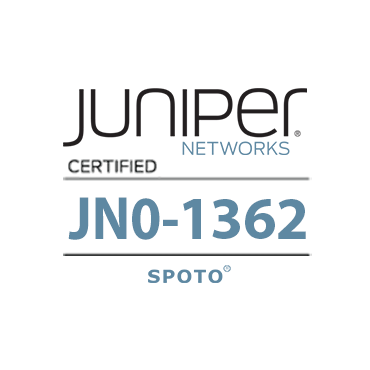
ジュニパーJN0-1362試験問題集ス&模擬試験【2025
デザインコースでは、ジュニパーネットワークスの設計理念と関連技術に関する能力を証明することができます。JNCDS-SPは、サービスプロバイダの設計、理論、ベストプラクティスに関する中級程度の知識を持つネットワーク専門家や設計者を対象にした、スペシャリストレベルの認定の1つです。筆記試験では、サービスプロバイダ設計の原則を理解していることを確認します。 スポトウジュニパーJN0-1362問題集スを取得すると、最短時間でジュニパーネットワークス認定サービスプロバイダ設計、スペシャリストになるための最も簡単な方法です。
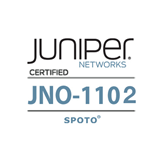
ジュニパーJN0-1102試験問題集&模擬試験[2025]。
デザインコースでは、ジュニパーネットワークスの設計理念と関連技術に関する能力を証明することができます。JNCDAは、ネットワーク設計、理論、ベストプラクティスに関する初級知識を持つネットワークプロフェッショナルや設計者を対象にしたアソシエイトレベルの認定資格です。筆記試験では、ネットワーク設計の基本を理解していることが確認されます。 SPOTOJuniper JN0-1102dumpsを取得すると、最短時間でジュニパーネットワークス認定デザイン、アソシエイトになるための最も簡単な方法です。
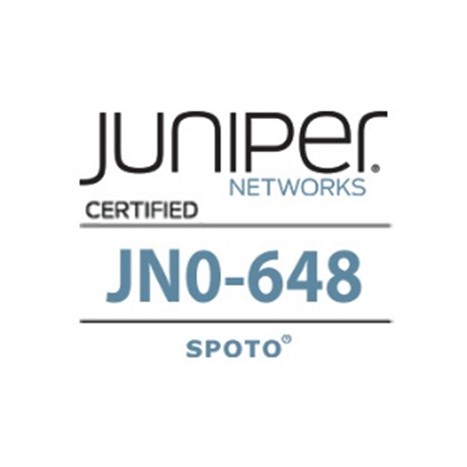
Juniper JN0-648 試験問題集 & Practice Exam [2025]です。
Enterprise Routing and Switchingトラックでは、ネットワーク技術全般とジュニパーネットワークスのエンタープライズ・ルーティングおよびスイッチング・プラットフォームに関する能力を証明することができます。JNCIP-ENTは、ジュニパーネットワークスのJunos OSに関する高度な知識を持つ経験豊富なネットワーク技術者を対象にしたプロフェッショナルレベルの認定資格です。筆記試験では、高度なルーティング技術、関連プラットフォームの設定とトラブルシューティングのスキルを理解していることを確認します。 スポトウジュニパーJN0-648問題集ス取得は、最短時間でジュニパーネットワークス認定エンタープライズルーティングおよびスイッチング、プロフェッショナル(JNCIS-ENT)になるための最も簡単な方法です。
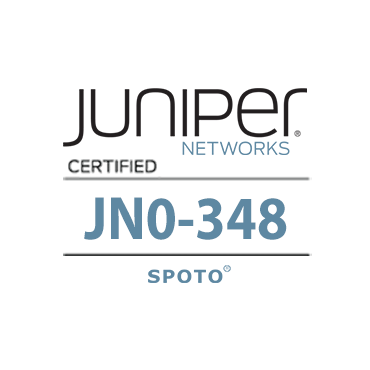
Juniper JN0-348 試験問題集 & Practice Exam [2025]です。
このトラックでは、ネットワーク技術全般とジュニパーネットワークスのエンタープライズ・ルーティング/スイッチング・プラットフォームに関する能力を証明することができます。JNCIS-ENTは、Junosのルーティングとスイッチングの実装に関する初級~中級の知識を持つ、経験豊富なネットワーク技術者を対象にしたスペシャリストレベルの認定資格です。筆記試験では、ルーティングとスイッチング技術の基本的な理解、関連するプラットフォームの設定とトラブルシューティングのスキルが確認されます。 スポトウジュニパーJN0-348問題集スを取得すると、最短時間でジュニパーネットワークス認定エンタープライズルーティングとスイッチング、スペシャリスト(JNCIS-ENT)になるための最も簡単な方法です。
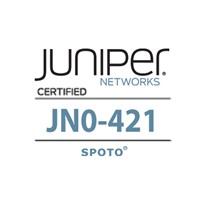
Juniper JN0-421 試験問題集 & Practice Exam [2025]です。
Automation and DevOps Track トラックでは、デバイスとネットワーク機能を自動化するための一般的なスクリプト言語とツールの能力を証明することができます。JNCIS-DevOpsは、自動化ツールやベストプラクティスに関する中級程度の知識を持つネットワーク技術者を対象としたスペシャリストレベルの認定資格です。筆記試験では、PyEZ、Python、AnsibleなどのスクリプトツールのJunosデバイスとネットワークへの適用に関する理解度を確認します。 スポトウジュニパーJN0-421問題集スを取得すると、最短時間でジュニパーネットワークス認定オートメーションおよびDevOps、スペシャリスト(JNCIS-DevOps)になるための最も簡単な方法です。